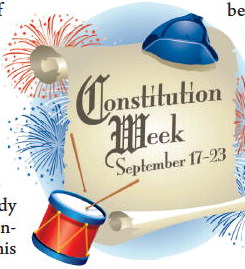editorials


The Most Remarkable Work:
They Got Us From The
Short Run To The Long Run
NOTE: September 17 -23, 2020, is observed as Constitution Week. The Advance is honored and privileged to reprint a most eloquently written editorial by our beloved late Publisher, Bill Ledford. This editorial was published in the September 18, 2002, edition of the then Advance- Progress, (now The Advance), one year after terrorists attacked our great nation.
The United States Constitution and the nation’s “Founders” cannot be separated.
There can be little doubt that the shape and character of the several basic entities of our government are mirrored in the relatively small number of leaders who knew each other, who collaborated and collided with each other. And almost by chance, this diverse group provided a system of checks and balances that guides this nation on a comparatively steady course of freedoms not enjoyed anywhere else on this earth.
Thecentralplayersinthedra- m a that gave us the document that proclaims and protects the freedoms of every man, woman and child of all races and creeds, in this nation — our Founding Fathers — shaped the history and the destiny of the United States with the writing of the Constitution of the United States, A Most Remarkable Work.
In this Pulitzer Prize winning national bestseller, Founding Brothers, author Joseph J. Ellis writes: “Mostly male, all white, this collection of public figures was hardly typical of the population as a whole; nor was it, on the other hand, a political elite like anything that existed in England or Europe.
“They were Americans first,” he adds later, saying that in many respects this country’s first, and only, natural aristocracy. They created the American republic, then held it together throughout the volatile and vulnerable early years by sustaining their presence until national habits and customs took root. In terms of our early distinction, they got us from the short run to the long run.”
Their task was not an easy one. Debates between Federalists and Antifederalists were fierce. Their patience was often tried, as well as long standing friendships with their fellow founders fractured, as they painstakingly labored to write this splendid treatment to the will to live as free people. It took 55 men four months during the summer of 1787 to draft the U.S. Constitution. Another 10 tortuous months to pass before it was ratified by the states.
Many of the infant nation’s “founders,” including Virginia’s Patrick Henry and New York’s governor, were opposed to it. Some feared a revival of government tyranny. Others wanted a Bill of Rights for citizens.
Supporters and opponents of the document, called Federalists and Antifederalists,
continued from page
respectively, started a vociferous campaign of publishing articles and broadsides in an attempt to sway the public for or against ratification.
After a fast start, the process stumbled when Rhode Island rejected the document. Then, in June 1788, New Hampshire’s ratification put the Constitution over the top. Still it took Virginia’s and New York’s approval afterwards to ensure that the United States remained unified.
Although they failed in halting ratification, opponents made a significant contribution. Their constant pressure ensured that a Bill of Rights for both citizens and states would be forthcoming from the new Congress. That diverse group of “founders,” all as human as you and I, gave us a “most remarkable document.” Americans need only glance at today’s headlines to find reasons to celebrate our Constitution. In almost every part of the work, the oppressed are valiantly struggling for their basic rights we were granted over two hundred years ago. During Constitution Week, September 17 – 23, read this magnificent document to understand why so many are willing to risk life itself to obtain its cherished benefits. Then vow that you will be equally eager to protect it and the American freedoms it represents from those within that would dilute its intent as well as maniacs with terrorist intentions.
“God Bless America.”








